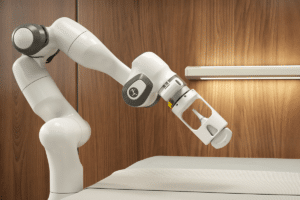A Brain-Computer Interface (BCI), also known as a Brain-Machine Interface (BMI), is a communication pathway between the brain and an external device, such as a computer or a prosthetic limb. BCIs work by detecting and interpreting the user’s neural activity and translating it into control signals for the external device.
There are various types of BCIs, including invasive, partially invasive, and non-invasive. Invasive BCIs involve implanting electrodes directly into the brain, while partially invasive BCIs involve placing electrodes on the surface of the brain. Non-invasive BCIs, on the other hand, use sensors on the scalp to detect brain activity.
BCIs have many potential applications, including medical and rehabilitative uses such as restoring movement to paralyzed patients or treating neurological disorders such as epilepsy or Parkinson’s disease. They can also be used in gaming and virtual reality applications, as well as in enhancing human performance and cognition.
However, BCIs also raise ethical concerns, including issues around privacy, informed consent, and potential risks associated with invasive procedures. Overall, BCIs have the potential to significantly impact the way we interact with technology and with each other, and further research and development in this field could lead to new and innovative applications.
Driving Factors of Brain-Computer Interface
The development of Brain-Computer Interfaces (BCIs) has been driven by a number of factors, including:
- Medical and Rehabilitation Needs: One of the primary driving forces behind BCI research is the need for medical and rehabilitative applications. BCIs can be used to restore lost movement or communication abilities in people with disabilities, such as paralysis or communication disorders.
- Advancements in Neuroscience: As our understanding of the brain and its functions has improved, so too has the potential for developing BCIs. Recent advancements in neuroscience, including brain imaging technologies, have allowed researchers to better understand how the brain works and to develop more sophisticated BCIs.
- Technological Developments: Technological advancements in areas such as miniaturization, wireless communication, and signal processing have enabled the development of more sophisticated BCIs. These advancements have made it possible to create less invasive and more user-friendly devices, which can be worn or implanted with minimal disruption to the user’s daily life.
- Increased Interest and Investment: The growing interest in BCIs among researchers, investors, and the general public has led to increased funding and resources for BCI development. This has allowed for more extensive research and development, which has in turn led to more advanced and capable BCIs.
- Potential for Commercial Applications: The potential for commercial applications, such as in gaming or virtual reality, has also driven BCI research. As the technology continues to develop and become more user-friendly, it is expected to become more widely adopted for these types of applications.
Key Companies in the Brain-Computer Interface Market
The Brain-Computer Interface (BCI) market is still in its early stages of development, but there are already several key companies that are making significant contributions to the field. Here are some of the most notable companies in the BCI market:
- Neuralink: Founded by Elon Musk, Neuralink is focused on developing BCIs that can be implanted directly into the brain. The company’s goal is to create a high-bandwidth interface between the brain and external devices, allowing for seamless communication between the two.
- Kernel: Kernel is focused on developing non-invasive BCIs that can be used for a variety of applications, including medical, gaming, and virtual reality. The company’s products are designed to be easy to use and accessible to a wide range of users.
- MindMaze: MindMaze is focused on developing BCIs for medical and rehabilitation applications. The company’s products are designed to help people with disabilities, such as paralysis, regain control of their bodies using their thoughts.
- Emotiv: Emotiv develops non-invasive BCIs for gaming, virtual reality, and other consumer applications. The company’s products are designed to be user-friendly and affordable, making them accessible to a wide range of consumers.
- g.tec: g.tec develops BCIs for medical and rehabilitation applications, as well as for communication and control in gaming and virtual reality. The company’s products are designed to be highly accurate and reliable, allowing for precise control of external devices.
- Blackrock Microsystems: Blackrock Microsystems is focused on developing advanced neural interfaces, including both invasive and non-invasive BCIs. The company’s products are designed for a variety of applications, including medical, research, and consumer applications.
Notable Innovations in Brain-Computer Interface
There have been many notable innovations in the field of Brain-Computer Interfaces (BCIs) over the years. Here are some examples:
- Mind-controlled prosthetic limbs: Researchers have developed BCIs that allow people with limb amputations to control prosthetic limbs with their thoughts. These BCIs use electrodes implanted in the remaining muscles or on the surface of the skin to detect muscle contractions, which are then translated into movements of the prosthetic limb.
- Non-invasive BCIs: Non-invasive BCIs, which use sensors on the scalp to detect brain activity, have become increasingly popular in recent years. These devices are less invasive and more user-friendly than their invasive counterparts, making them more accessible to a wider range of people.
- Brain-Computer Interfaces for communication: BCIs have been developed to help people with communication disorders, such as ALS or locked-in syndrome, communicate with others. These BCIs allow users to select letters or words on a computer screen using their thoughts, which are then translated into text or speech.
- Brain-controlled video games: BCIs have been used to control video games using the power of the mind. In these games, users can control the movement of characters or objects in the game using their thoughts, rather than a controller or keyboard.
- Brain-Computer Interfaces for paralysis: BCIs are being developed to help people with paralysis regain control of their bodies. These BCIs use brain signals to control electrical stimulation of the muscles, allowing users to perform tasks such as grasping or lifting objects.
- Advanced signal processing techniques: Recent advancements in signal processing techniques have improved the accuracy and speed of BCIs. These techniques allow for faster and more reliable communication between the brain and external devices, making BCIs more practical and useful.
Overall, these innovations and many others are expanding the potential applications of BCIs and making them more accessible to a wider range of people.
In conclusion, Brain-Computer Interface (BCI) technology is a rapidly advancing field with enormous potential for applications in various domains. From medical and rehabilitation applications to gaming and virtual reality, BCIs have the potential to revolutionize the way we interact with our environment and improve the quality of life for individuals with disabilities.







